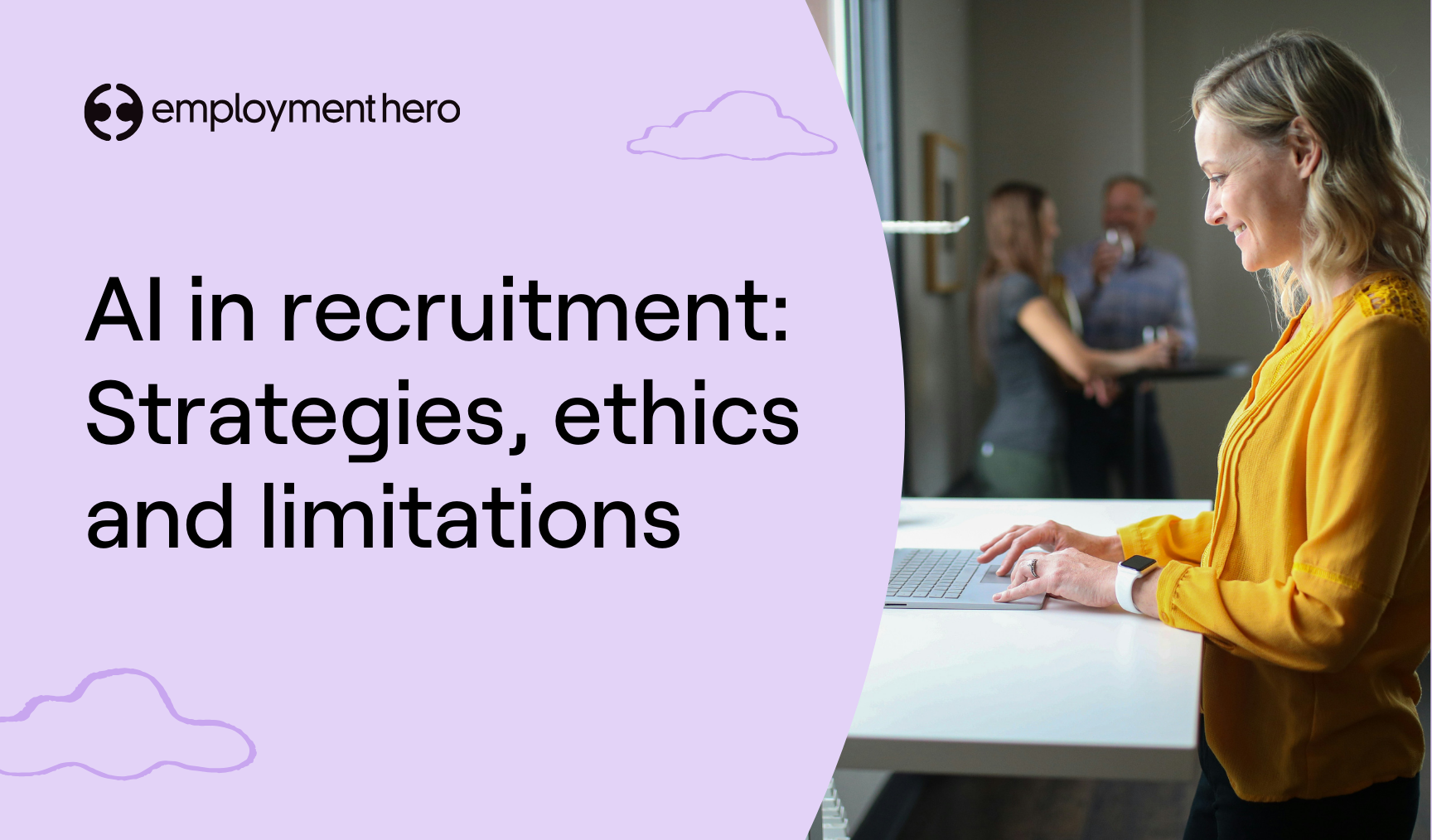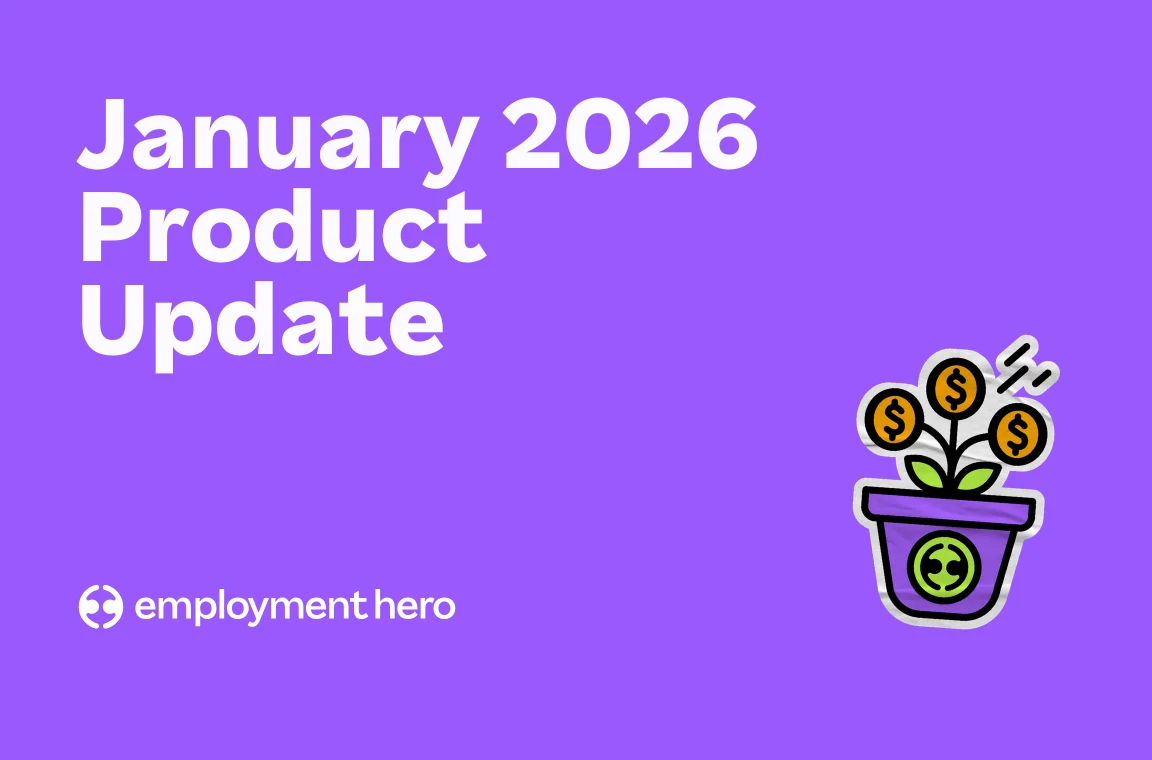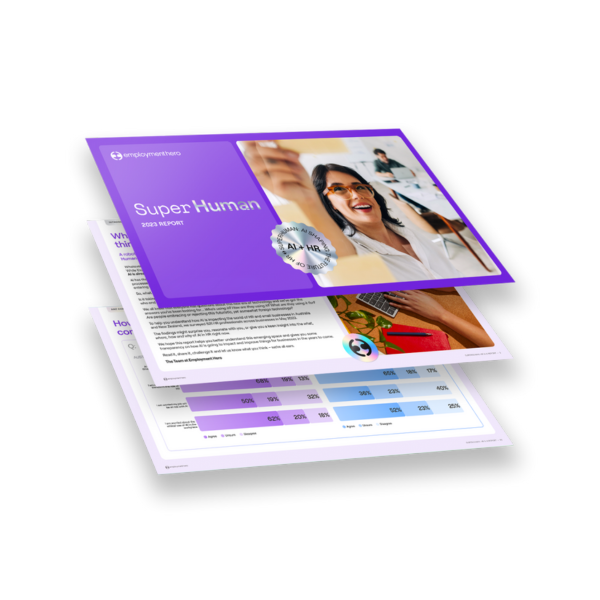AI in recruitment: Strategies, ethics and limitations
Discover the current state of AI in recruitment, ethical considerations, and how to harness its power for successful candidate screening and communication.

Artificial intelligence or AI in recruitment is rapidly transforming the way businesses hire. IT promises faster processes, smarter decision-making and improved candidate experiences. Talk about setting high expectations.
Yet, according to Employment Hero’s latest research, Work That Works Report, the adoption gap is striking. Businesses that have not invested in tech advancements are 58% more likely to say recruitment is a serious or critical challenge. And while AI is a hot topic, its actual use in the workplace lags, usage of AI ranks last out of a list of 20 drivers of productivity among employees.
But with great power comes great responsibility and while artificial intelligence offers many benefits in the hiring landscape, it does have limitations and the ethical ramifications also need to be considered.
We’ll dive into what AI in recruitment is, its key benefits, the most popular AI recruitment tools, the ethical questions it raises and how to use it responsibly for the future of hiring.
What is AI in recruitment?
Starting off with the basics, AI in recruitment is the practice of using advanced algorithms, machine learning and natural language processing (NPL) to automate, streamline and improve various stages of the hiring process.
Unlike traditional recruitment software that simply automates repetitive tasks, artificial intelligence systems can learn from data, adapt over time and make increasingly accurate predictions about candidate suitability.
Key use cases in modern hiring
The use cases for artificial intelligence in the hiring space are rapidly expanding, forward thinking teams are now using it for:
- Resume and application screening: Artificial intelligence scans CVs to identify relevant skills, experience and qualifications, shortlisting the best candidates in minutes.
- Candidate assessments: Adaptive testing platforms adjust difficulty and content based on candidate responses, providing a more accurate skills evaluation.
- Interview scheduling: Artificial intelligence assistants coordinate calendars automatically, removing the need for manual back-and-forth emails.
- Chatbots for candidate engagement: AI-powered chatbots answer questions instantly, provide application updates and guide candidates through the process.
- Predictive analytics: Algorithms forecast candidate performance, cultural fit and retention likelihood based on historical data.
How AI differs from traditional recruitment tech
Traditional hiring tech has the ability to automate fixed tasks, whereas AI in recruitment goes further by incorporating:
- Learning and adaptation: Artificial intelligence models improve accuracy over time as they process more data.
- Natural Language Processing (NLP): Enables artificial intelligence to “read” CVs, interpret job descriptions and understand candidate queries in context.
- Data-driven predictions: Artificial intelligence can identify patterns and make forecasts, rather than just executing pre-set rules.
In short, traditional recruitment tools do what they’re programmed to do, while AI recruitment tools learn and evolve, offering more dynamic and context-aware hiring support.
Benefits of AI for recruiting teams
When teams implement it correctly, AI for recruiting delivers measurable improvements and by automating repetitive tasks and leveraging data-driven insights, it enables hiring teams to work smarter, not harder.
Here’s how AI helps in recruitment.
Time and cost savings
Artificial automation can significantly reduce the time spent on manual tasks, such as:
- Reviewing CV’s
- Scheduling interviews
- Initial candidate communication
Tasks that once took hours or days can now be completed in minutes. Which is a real life saver for time poor business owners, HR professionals and hiring managers. Having a more streamlined process lowers time-to-hire, reduces cost-per-hire and allows hiring managers to dedicate more time to high-value strategic work, like building candidate relationships and strengthening employer branding.
Enhancing candidate experience
Artificial intelligence is beneficial for both parties during the hiring process and it can improve candidate experience massively. With chatbots, personalised job recommendations and instant updates, candidates received a faster, more consistent experience.
Not only does this improve engagement but also builds trust in the hiring process. A streamlined, responsive hiring journey can be the deciding factor for top candidates choosing between multiple offers.
Better talent matching and predictive hiring
Artificial intelligence goes beyond keyword matching by analysing skills, experience and contextual information to identify the most suitable candidates. Predictive hiring models can forecast long-term performance, cultural fit and retention likelihood. This results in stronger hires, reduced turnover and better team performance over time.
Popular AI recruitment tools to know
The market for AI recruitment tools is expanding… fast. And it’s offering solutions for every stage of the hiring journey, from sourcing candidates to onboarding them.
But with so many on the market, how do you know which one suits your needs best? Below is a selection of leading AI recruitment tools shaping the industry:
| Tool | Speciality | Noteworthy Features |
|---|---|---|
| Employment Hero | End-to-end HR, hiring and payroll solutions. | More relevant candidate suggestions with SmartMatch, instant access to candidates, Applicant Tracking System (ATS) and salary benchmarking. |
| HireVue | Video interviewing and assessments. | AI-driven video analysis, sentiment detection, structured scoring. |
| Pymetrics | Candidate assessments. | Neuroscience-based games, behavioural trait mapping, bias reduction |
| Eightfold | Talent intelligence | AI-powered skills mapping, workforce planning, diversity insights. |
| LinkedIn AI Tools | Talent sourcing and matching | Smart job recommendations, skills-based search, talent insights |
Just like your hiring process, the tools available vary in scope, some focus on candidate engagement while others specialise in interview assessment. Choosing the right platform depends on your organisation’s hiring needs, budget and existing tech stack.
Ethical concerns and AI bias in hiring
Although AI in recruitment enhances efficiency and allows companies to scale their processes, it also raises important ethical recruitment questions. It’s essential to ensure that when introducing new tools and processes, fairness, transparency and accountability are still at the heart of what you’re doing.
It’s also important to recognise that while tools can improve many elements of a process, without proper safeguards in place, adding in new tools risks creating or reinforcing bad practices.
Examples of bias in AI models
Hiring bias is a very real thing and although companies are making leaps and bounds to eradicate it, it’s not something that can be fixed overnight. And it’s the same with AI recruitment tools.
It’s important to remember that artificial intelligence is only as good as the data it’s given and bias in these platforms often emerges from the data it was trained with. If historical hiring records reflect an overrepresentation of certain demographics, artificial intelligence may replicate those patterns when shortlisting candidates.
Examples include:
- Gender bias: Models favouring male candidates due to historically male-dominated applicant pools.
- Ethnic bias :AI deprioritising candidates with names, educational backgrounds or work histories associated with underrepresented groups.
- Socioeconomic bias: Overemphasis on elite universities or companies, overlooking talented candidates from different paths.
These biases are often invisible unless specifically tested for, making regular audits essential.
Legal and compliance implications in the UK
Whenever introducing a new process or tool, compliance with UK law is always something you should be thinking about. In the UK, using artificial intelligence for hiring is subject to existing employment and data protection laws, including:
- Equality Act 2010: Prohibits discrimination based on protected characteristics such as (but not inclusive to) age, gender, race, disability and religion.
- Data Protection Act 2018:Upholds privacy rights provided by the UK GDPR, setting rules for the lawful collection, storing and processing of personal data
- Artificial Intelligence (Regulation) Bill [HL]: Looks to establish an AI authority to oversee safe and ethical AI use, mandates regulatory principles, requires designated AI Officers in organisations, enforces transparency on training data and intellectual property, and introduces regulatory sandboxes for innovation.
With artificial intelligence evolving so quickly, it’s recommended that businesses keep up-to-date with legislative changes to prevent the risk of falling behind.
How HR leaders can mitigate AI risks
AI in recruitment comes with both benefits and risks. So for business leaders and HR professionals, it’s important to find ways of reducing the risks and build confidence in hiring driven by artificial intelligence.
To do this, HR managers and business leaders should:
- Audit algorithms regularly: Test for disparate impacts across different demographic groups.
- Use diverse datasets: Train artificial intelligence models on balanced, representative data to minimise unconscious bias.
- Maintain human oversight: Keep recruiters in the loop for all critical hiring decisions.
- Be transparent with candidates: Clearly explain when and how AI is used and provide a way to challenge automated outcomes.
By embedding these practices into recruitment strategies, businesses can use AI in recruitment responsibly, aligning innovation with fairness and compliance.
Limitations and risks of AI in recruitment
While AI in recruitment can dramatically improve efficiency, it’s not without drawbacks. Over-reliance on algorithms risks losing the human insights that are often critical to choosing the perfect hire.
From false positives to tech limitations, HR leaders must understand where tech shines and where it still falls short.
Where AI still struggles
Even the most advanced AI recruitment tools have blind spots:
- Nuance in candidate backgrounds: Artificial intelligence may undervalue unconventional career paths or non-linear work histories that could indicate resilience and adaptability.
- Contextual understanding: Algorithms can misinterpret industry-specific jargon or fail to capture soft skills like leadership and creativity.
- False positives/negatives: A perfectly qualified candidate might be screened out due to formatting issues or keyword mismatches, while less-suitable candidates might slip through.
- Technology gaps: Artificial intelligence depends on high-quality, standardised data; incomplete or inconsistent inputs reduce accuracy.
When human judgement is essential
As helpful as tech can be, nothing can quite replace human touch. Some decisions can’t be made by artificial intelligence alone. Business leaders, HR professionals and hiring managers are vital for:
- Cultural fit assessment:Determining if a candidate aligns with team values and company culture.
- High-stakes roles: Senior leadership positions or mission-critical hires where misjudgement has major consequences.
- Complex negotiations: Salary discussions, role shaping and flexibility arrangements that require empathy and nuance.
- Ethical considerations: Interpreting candidate information within the framework of fairness and inclusivity.
Ultimately, AI in recruitment should be a supporting tool, not a replacement for human expertise. The best hiring outcomes come from a collaborative model, where technology handles scale and speed and people handle empathy and strategic thinking.
Best practices for using AI responsibly in hiring
To unlock the benefits of AI in recruitment without falling into common pitfalls, HR leaders must take a balanced, ethical approach. In practice, this means artificial intelligence should empower humans to do their best work, not replace their jobs. For hiring, this means pairing data-driven insights with empathy, strategic thinking and a strong governance framework.
Here are some best practices for using technology responsibly when hiring:
Combining human and machine decision-making
Artificial intelligence is a powerful tool in the early stages of hiring. It can speed-up manual processes like screening, scheduling and predictive shortlisting. But the final decision should always sit with humans.
Hiring managers, HR professionals and business owners should:
- Let AI handle the volume: Use algorithms to narrow down the applicant pool quickly.
- Rely on human judgment for the final selection: This ensures cultural fit, nuanced assessment and fairness.
- Collaborate, don’t compete: Think of artificial intelligence as a recruitment team member that works 24/7 on repetitive tasks, freeing people for high-value conversations.
Regular auditing and data governance
It’s important to keep in mind that artificial intelligence tools are only as good as the data they’re fueled with. So regularly auditing data is an essential part of using tech, as without regular checks, bias and inaccuracies can creep in unnoticed.
It’s recommended that business leaders and HR professionals:
- Conduct quarterly audits to assess whether AI recommendations align with diversity, equity and inclusion goals.
- Refresh training data to ensure it’s representative and up to date.
- Establish clear data handling policies to remain compliant with GDPR, the UK Equality Act and emerging AI governance frameworks.
Transparency with candidates
Openness builds trust. Candidates should know when artificial intelligence is part of their recruitment journey.
- Explain AI’s role clearly in job postings or during application stages.
- Offer opt-outs or alternative processes where possible.
Provide feedback channels so candidates can query or challenge automated outcomes.
Transparent communication not only meets regulatory expectations but also strengthens employer branding in a competitive talent market.
Is AI the future of recruitment?
Artificial intelligence is now a permanent part of the recruitment landscape and it’s not going anywhere.So AI in recruitment is here to say. But it’s not about replacing humans with machines, it’s about creating a hybrid hiring model where human insight and technology work in tandem.
We’re already seeing the rise of AI recruitment agents that can source candidates, answer queries and schedule interviews autonomously. As these tools mature, they’ll likely take on even more of the operational load, leaving human recruiters free to focus on strategic decision-making, complex negotiations and relationship building.
The future will be shaped by ethical innovation. Companies that use AI responsibly, with fairness, compliance and candidate experience at the heart, won’t just make better hires. They’ll also stand out as employers of choice in an increasingly competitive talent market
AI and recruitment in a balanced world
At Employment Hero, we see AI in recruitment as a powerful enabler, not a replacement. Technology can handle the scale, speed and data processing that humans can’t, but people bring the empathy, creativity and ethical judgment that machines can’t replicate.
By blending innovation with responsibility, HR leaders can create hiring strategies that are faster, fairer and more human-centred, ensuring that technology serves as a tool for empowerment, not exclusion.
To start your AI-driven hiring journey, talk to one of our employment specialists today.
Related Resources
-
 Read more: Product Update: January 2026
Read more: Product Update: January 2026Product Update: January 2026
Welcome to the January 2026 product update from the Employment Hero team. We’ve got lots to share around Custom Forms,…
-
 Read more: Minimum Wage & Statutory Pay Increases: Turn Compliance Into a People Win
Read more: Minimum Wage & Statutory Pay Increases: Turn Compliance Into a People WinMinimum Wage & Statutory Pay Increases: Turn Compliance Into a People Win
Learn how HR leaders can transform statutory pay increases into a strategic opportunity to boost morale, fairness and engagement.
-
 Read more: 7 Ways Employment Hero Can Help You Retain Top Talent
Read more: 7 Ways Employment Hero Can Help You Retain Top Talent7 Ways Employment Hero Can Help You Retain Top Talent
Contents Retaining top talent in 2026 is about more than providing a positive workplace culture; employees are looking for jobs…





















